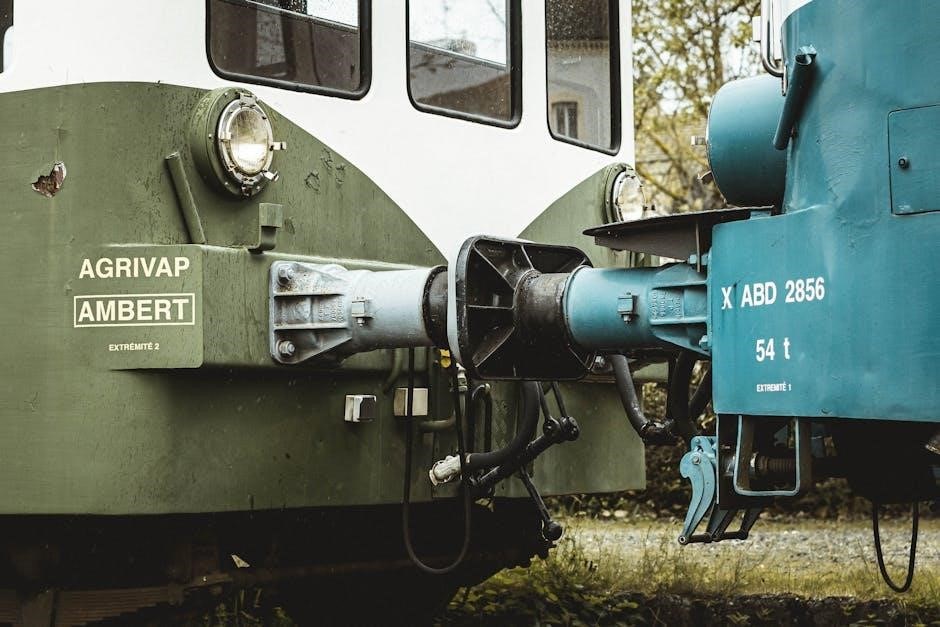NFPA 54, also known as ANSI Z223;1, provides critical safety standards for fuel gas systems, ensuring public safety and protecting people and property from potential hazards. It covers the design, installation, and maintenance of fuel gas piping systems, appliances, and related accessories. This comprehensive code is essential for engineers, contractors, and inspectors to ensure compliance with national safety requirements. Regular updates reflect the latest technologies and safety practices, making NFPA 54 a cornerstone of fuel gas safety. The code is widely accessible, with free online versions available through NFPA, facilitating its adoption and enforcement across various industries.
Overview of NFPA 54 and Its Importance
NFPA 54, the National Fuel Gas Code, establishes essential safety standards for fuel gas systems, appliances, and piping. It ensures safe installation, operation, and maintenance, protecting lives and property from fire and explosion hazards. Regular updates reflect advancements in technology and industry practices, making it a critical resource for compliance and public safety. Its application spans residential, commercial, and industrial settings, reinforcing its importance in fuel gas safety.
NFPA 54 Handbook: Enhancing Safety Compliance
The NFPA 54 Handbook offers detailed guidance to enhance safety compliance, providing in-depth interpretations and practical applications of the code. It includes expert commentary, illustrations, and examples to clarify complex requirements, ensuring users can effectively implement safety measures. This resource is invaluable for professionals seeking to understand and apply NFPA 54 standards accurately, promoting consistent compliance across fuel gas systems.

Scope and Application of NFPA 54
NFPA 54 applies to fuel gas piping systems, appliances, and related equipment, ensuring safe design, installation, and operation. It covers residential, commercial, and industrial applications, providing comprehensive safety standards for fuel gas systems.
Fuel Gas Systems and Appliances Covered Under NFPA 54
NFPA 54 encompasses a wide range of fuel gas systems, including natural gas and propane piping, appliances, and equipment. It covers residential and commercial systems, such as ranges, ovens, water heaters, and clothes dryers. The code also addresses industrial applications, ensuring safety in LNG plants and other specialized fuel gas installations. Compliance with NFPA 54 is essential for protecting people and property from fire and explosion hazards.
Application of NFPA 54 in LNG Plants
NFPA 54 is crucial for LNG plants, ensuring the safe handling and use of fuel gas systems. It provides specific guidelines for the design, installation, and operation of gas piping and appliances in these facilities. The code addresses unique risks associated with LNG operations, such as high-pressure systems and venting requirements, to prevent hazards and ensure compliance with safety standards.
Safety Requirements for Fuel Gas Piping Systems
NFPA 54 outlines essential safety measures for fuel gas piping, including proper design, installation, and venting to prevent hazards. Shutoff valves and electrical continuity are addressed.
Minimum Safety Requirements for Design and Installation
NFPA 54 establishes minimum safety requirements for fuel gas piping systems, ensuring safe design and installation. Mandatory guidelines include proper materials, jointing methods, and venting systems. Compliance with these standards prevents gas leaks and potential hazards, ensuring the integrity of fuel gas systems in residential and commercial settings.
Vent Pipe Requirements and Safety Provisions
NFPA 54 specifies that vent pipes must terminate outdoors, excluding regulators and vent-limiting means listed under ANSI Z21.80/CSA 6.22. Proper venting ensures safe gas discharge, preventing hazardous accumulations. These provisions are critical for maintaining system safety and compliance with national standards, as outlined in the code.

Design and Installation Guidelines
NFPA 54 outlines design and installation guidelines, emphasizing the use of approved materials and jointing methods to ensure system integrity and safety, adhering to NFPA standards.
Materials and Jointing Methods for Piping Systems
NFPA 54 specifies approved materials for fuel gas piping, including steel, copper, and CPVC, ensuring durability and safety. Jointing methods like welding, flanging, and threading are detailed, requiring adherence to standards for leak prevention. Proper material selection and jointing techniques are critical to maintaining system integrity and preventing hazards, aligning with NFPA 54’s safety objectives.
Electrical Continuity in Metallic Piping Systems
NFPA 54 requires electrical continuity in metallic piping systems to prevent static electricity buildup, which can ignite flammable gases. This is achieved through bonding or grounding, ensuring safe operation. Proper installation and maintenance of these systems are critical to prevent hazards. Electrical continuity must be verified during installation to comply with NFPA 54 standards, safeguarding against potential ignition sources and ensuring reliable fuel gas system performance.
Venting and Combustion Air
NFPA 54 requires proper venting of fuel gas systems to prevent hazardous gas accumulation. Vent pipes must terminate outdoors, ensuring safe dispersion of combustion products. Combustion air provisions are critical to maintain efficient and safe appliance operation, adhering to NFPA 54 guidelines for installation and maintenance.
Vent Pipe Installation and Outdoor Venting Requirements
Vent pipes for fuel gas systems must terminate outdoors, excluding certain regulators and vent-limiting means combinations listed under ANSI Z21.80/CSA 6.22. NFPA 54 mandates that vent pipes be installed to prevent back drafting and ensure safe gas dispersion. Proper sizing, material selection, and termination practices are critical to comply with safety standards. Outdoor venting ensures hazardous gases are safely released away from occupied spaces, reducing fire and explosion risks.
Combustion Air Provisions and Calculations
NFPA 54 specifies requirements for combustion air supply to fuel-burning appliances, ensuring proper fuel combustion and preventing carbon monoxide buildup. The code provides methods for calculating combustion air needs based on appliance type and installation conditions. Adequate ventilation and air supply are critical to maintain safety and efficiency, preventing potential hazards like explosion or incomplete combustion. Compliance ensures reliable operation of fuel-fired systems.

Appliances and Equipment
NFPA 54 covers safety requirements for fuel gas appliances, including ranges, cooking units, hot plates, and clothes dryers. It ensures proper installation and operation to prevent hazards.
Range, Built-in Cooking Units, and Hot Plates
NFPA 54 specifies safety requirements for ranges, built-in cooking units, and hot plates, ensuring they are listed and properly installed. These appliances must meet venting and exhaust standards to prevent hazards. Proper installation ensures safe operation, while compliance with NFPA 54 guarantees adherence to national safety guidelines for fuel gas systems. This ensures public safety and protects property from potential risks associated with improper installation or use of these appliances.
Clothes Dryers and Other Listed Appliances
NFPA 54 regulates clothes dryers and other listed appliances, ensuring safe installation and operation. Clothes dryers must be vented properly to prevent gas leaks and carbon monoxide risks. Other appliances, such as water heaters and boilers, must also comply with specific installation and venting requirements. Proper adherence to NFPA 54 standards ensures safe operation and minimizes potential hazards associated with fuel gas systems.

Maintenance and Inspection
Regular maintenance and inspection of fuel gas systems are crucial for ensuring safety and efficiency. Inspections focus on shutoff valves, vent limiting means, and system integrity to prevent hazards and ensure compliance with NFPA 54 standards.
General Maintenance Requirements for Fuel Gas Appliances
Regular maintenance of fuel gas appliances is essential to ensure safe operation and compliance with NFPA 54. This includes inspecting shutoff valves, vent pipes, and connections for leaks or damage. Appliances must be serviced according to manufacturer instructions, and any faulty components should be repaired or replaced promptly. Proper maintenance prevents hazards like gas leaks or incomplete combustion, ensuring system efficiency and safety.
Inspection of Shutoff Valves and Vent Limiting Means
Regular inspection of shutoff valves and vent limiting means is crucial for ensuring safe operation. Valves must function correctly, and vent limiting means should meet specific standards to prevent hazards. Inspections should verify proper operation and compliance with NFPA 54 requirements, addressing any malfunctions promptly to maintain system safety and efficiency.
Compliance and Enforcement
Compliance with NFPA 54 is enforced by regulatory bodies, ensuring adherence to safety standards. Penalties for non-compliance can include fines and legal actions.
Code Enforcement and Regulatory Bodies
Regulatory bodies enforce NFPA 54 standards to ensure compliance with safety requirements for fuel gas systems. These entities conduct inspections and audits to verify adherence to the code.
Non-compliance can result in penalties, including fines and legal actions. NFPA provides free online access to its codes, facilitating enforcement and promoting public safety through standardized practices.
Penalties for Non-Compliance with NFPA 54
Non-compliance with NFPA 54 can result in significant penalties, including fines and legal actions. Regulatory bodies enforce these standards, and violations may lead to financial consequences. Organizations must adhere to the code to avoid penalties and ensure public safety. NFPA 54 violations can also damage reputations and lead to operational shutdowns until compliance is achieved.

Access to the NFPA 54 Standard
Access to the NFPA 54 standard is available online for free, enabling easy compliance with safety codes. NFPA 54 PDF versions can be downloaded from the official website, promoting convenient access to critical safety guidelines and updates.
Free Online Access to NFPA Codes and Standards
NFPA offers free online access to its codes and standards, including NFPA 54, through its official website. This initiative promotes public safety by making critical safety information widely accessible. Users can easily view or download the documents, ensuring compliance with the latest safety requirements. The availability of NFPA 54 PDF versions facilitates quick reference and implementation across industries.
Copyright and Usage Restrictions for NFPA 54
NFPA 54 is a copyrighted document owned by the National Fire Protection Association. While free online access is provided for personal use, commercial distribution or modification requires explicit permission. Users must adhere to NFPA’s terms of use to avoid copyright violations. Unauthorized reproduction or alteration of the NFPA 54 PDF is prohibited, ensuring the integrity and accuracy of the safety standards are maintained.

Common Applications of NFPA 54
NFPA 54 is widely applied in residential fuel gas piping systems, ensuring safe installations in homes. It also governs commercial and industrial fuel gas systems, regulating appliances and equipment in larger facilities.
Residential Fuel Gas Piping Systems
NFPA 54 provides detailed requirements for residential fuel gas piping systems, ensuring safe design, installation, and operation. It covers fuel lines for heating systems, appliances, and fireplaces, emphasizing proper venting and shutoff valve installations. The code ensures compliance with safety standards, protecting homes from gas leaks and fire hazards. Regular updates reflect advancements in materials and technologies, making it essential for residential gas system safety.
Commercial and Industrial Applications
NFPA 54 is crucial for commercial and industrial fuel gas systems, ensuring safe installation and operation. It covers large-scale piping, appliances, and equipment in factories, warehouses, and high-rise buildings. The code provides detailed requirements for design, venting, and shutoff valves, reducing risks of gas leaks and explosions. Compliance with NFPA 54 is essential for maintaining safety standards in industrial settings, protecting both personnel and property.
Revisions and Updates
NFPA 54 undergoes periodic revisions to incorporate new technologies and safety practices. Recent updates align with the NFPA Manual of Style, improving clarity and structure for users.
Recent Revisions to NFPA 54
Recent revisions to NFPA 54 focus on enhancing clarity and safety. Updates include separating requirements into multiple paragraphs to comply with the NFPA Manual of Style. New sections address fuel gas systems in LNG plants, vent pipe installations, and electrical continuity in metallic piping systems. These changes ensure the code remains aligned with modern safety practices and technologies, providing clearer guidance for users.
Compliance with NFPA Manual of Style
NFPA 54 now adheres to the NFPA Manual of Style, enhancing readability and consistency. Revisions include splitting sections with multiple requirements into separate paragraphs for clarity. This ensures that each provision is distinct and easily interpretable, facilitating better enforcement and understanding. Compliance with the manual improves the code’s structure, making it user-friendly while maintaining its rigorous safety standards and technical accuracy.
NFPA 54 is essential for ensuring fuel gas safety, providing clear guidelines for design, installation, and maintenance. Adhering to its standards is crucial for preventing hazards and ensuring compliance with national safety regulations. Regular updates and free online access make it a vital resource for professionals across various industries.
NFPA 54 provides comprehensive safety standards for fuel gas systems, covering design, installation, and maintenance. It addresses piping systems, appliances, and venting requirements, ensuring electrical continuity and combustion air provisions. The code emphasizes regular inspections and compliance with updated regulations. By adhering to NFPA 54, professionals can mitigate hazards, ensuring safe fuel gas operations across residential, commercial, and industrial applications while aligning with the latest industry practices and standards.
Importance of Adhering to NFPA 54 Guidelines
Adhering to NFPA 54 guidelines is crucial for preventing fuel gas hazards, ensuring system integrity, and safeguarding lives. Compliance minimizes risks like explosions and gas leaks, while promoting legal adherence. Regular updates in the code reflect evolving safety practices, making adherence essential for maintaining reliable and secure fuel gas systems in various applications. Proper compliance ensures long-term safety and operational efficiency.
